
Conclusion of the admonishment given by the Prophet, God bless and save him, to the sick man. تتمه ی نصیحت رسول صلی الله علیه و آله بیمار را
گفت پیغمبر مر آن بیمار را
چون عیادت کرد یار زار را
The Prophet said to the sick man, when he visited (his) suffering friend,
که مگر نوعی دعایی کردهای
از جهالت زهربایی خوردهای
“Maybe you have made a prayer of some (peculiar) sort, and from ignorance have (as it were) eaten some poisoned food.
یاد آور چه دعا میگفتهای
چون ز مکر نفس میآشفتهای
Bring to mind what (sort of) a prayer you said when you were being vexed by the guile of the fleshly soul.”
گفت یادم نیست الا همتی
دار با من یادم آید ساعتی
He answered, “I do not remember; but direct a (spiritual) influence towards me, and it (the prayer) will come to my memory in a moment.”
از حضور نور بخش مصطفا
پیش خاطر آمد او را آن دعا
Through the light-giving presence of Mustafá (Mohammed), that prayer came into his mind;
همت پیغمبر روشنکده
پیش خاطر آمدش آن گم شده
(From) the aspiration of the Prophet who dwells in light there came into his mind that which had been lost;
تافت ز آن روزن که از دل تا دل است
روشنی که فرق حق و باطل است
Through the window which is between heart and heart flashed the light that separates truth and falsehood.
گفت اینک یادم آمد ای رسول
آن دعا که گفتهام من بو الفضول
He said, “Look now, I have remembered, O Prophet, the prayer which I, impertinent fool, spoke.
چون گرفتار گنه میآمدم
غرقه دست اندر حشایش میزدم
When I was being caught in (the toils of) sin, and drowning (therein) was clutching at straws.
از تو تهدید و وعیدی میرسید
مجرمان را از عذاب بس شدید
(Whilst) there was coming from thee to sinners a threat and menace of punishment exceedingly severe.
مضطرب میگشتم و چاره نبود
بند محکم بود و قفل ناگشود
(And) I was becoming agitated, and there was no help (for me), (since) there were chains made fast and a lock not (to be) opened:
نی مقام صبر و نه راه گریز
نی امید توبه نه جای ستیز
Neither room for patience nor means of flight, neither hope of repenting nor opportunity for rebelling
من چو هاروت و چو ماروت از حزن
آه میکردم که ای خلاق من
I, like Hárút and Márút was crying in sorrow, ‘Alas!’ and saying, ‘O my Creator!’”
از خطر هاروت و ماروت آشکار
چاه بابل را بکردند اختیار
Because of the dangers (of the Last Judgement) Hárút and Márút openly chose the pit of Babylon,
تا عذاب آخرت اینجا کشند
گربزند و عاقل و ساحروشاند
So that they might suffer here (in this world) the punishment of the world to come; and they are cunning and intelligent and magician-like.
نیک کردند و بجای خویش بود
سهلتر باشد ز آتش رنج دود
They acted well, and ‘twas fitly done: the pain of smoke is lighter than (that of) fire.
حد ندارد وصف رنج آن جهان
سهل باشد رنج دنیا پیش آن
The pain of that (future) world is beyond description; light is the pain of this world beside it.
ای خنک آن کاو جهادی میکند
بر بدن زجری و دادی میکند
Oh, happy he that wages a holy war (of self-mortification), and puts a restraint upon the body and deals justice (against it),
تا ز رنج آن جهانی وارهد
بر خود این رنج عبادت مینهد
And, in order that he may be delivered from the pain of that world, lays upon himself this pain of serving God.
من همیگفتم که یا رب آن عذاب
هم در این عالم بران بر من شتاب
“I was saying, ‘O Lord, quickly inflict on me in this world that punishment,
تا در آن عالم فراغت باشدم
در چنین درخواست حلقه میزدم
So that I may have exemption (from it) in yonder world.’ About such-like a request was I knocking at the door .
این چنین رنجوریی پیدام شد
جان من از رنج بیآرام شد
(Thereupon) such a (painful) sickness as this appeared in me: through pain my soul was deprived of rest.
ماندهام از ذکر و از اوراد خود
بیخبر گشتم ز خویش و نیک و بد
I have been left without power to perform my dhikr (commemoration of God) and litanies: I have become unconscious of myself and of (all) good and ill.
گر نمیدیدم کنون من روی تو
ای خجسته وی مبارک بوی تو
If I had not now beheld thy face, O thou whose scent is fortunate and blessed,
میشدم از دست من یک بارگی
کردیم شاهانه این غم خوارگی
I should have passed altogether from the bondage (of this life). Thou in kingly fashion hast bestowed on me this sympathy.”
گفت هیهی این دعا دیگر مکن
بر مکن تو خویش را از بیخ و بن
Said the Prophet, “Hey! do not offer this prayer again: do not dig yourself up from root and base.
تو چه طاقت داری ای مور نژند
که نهد بر تو چنان کوه بلند
What strength have you, O wretched ant, to endure that He should lay on you such a lofty mountain?”
گفت توبه کردم ای سلطان که من
از سر جلدی نه لافم هیچ فن
He answered, “O Sultan, I repent (and vow) that in no wise will I (henceforth) brag recklessly.
این جهان تیه است و تو موسی و ما
از گنه در تیه مانده مبتلا
This world is the Desert (of the Israelites), and thou art Moses, and we because of (our) sin remain in the Desert in tribulation.
سالها ره میرویم و در اخیر
همچنان در منزل اول اسیر
We are wayfaring for years, and at the end we are still held captive in the first stage (of the journey).
گر دل موسی ز ما راضی بدی
تیه را راه و کران پیدا شدی
If the heart of Moses were pleased with us, there would be shown (to us) the way through the Desert and the (farthest) border (thereof);
ور به کل بیزار بودی او ز ما
کی رسیدی خوانمان هیچ از سما
And if he were wholly disgusted with us, how by any means would trays of food come to us from heaven?
کی ز سنگی چشمهها جوشان شدی
در بیابانمان امان جان شدی
How would springs gush from a rock, (and how) would there be security for our lives in the desert?
بل به جای خوان خود آتش آمدی
اندر این منزل لهب بر ما زدی
Nay, truly, fire would come instead of trays: flames would beat upon us in this abode.
چون دو دل شد موسی اندر کار ما
گاه خصم ماست گاهی یار ما
Forasmuch as Moses has become of two minds concerning us, he is sometimes our enemy and sometimes our friend.
خشمش آتش میزند در رخت ما
حلم او رد میکند تیر بلا
His anger sets fire to our goods; his clemency averts the arrow of affliction.
کی بود که حلم گردد خشم نیز
نیست این نادر ز لطفت ای عزیز
When (how) may it be that anger shall again become clemency? This is not extraordinary (as proceeding) from thy grace, O venerable one.
مدح حاضر وحشت است از بهر این
نام موسی میبرم قاصد چنین
To praise any one present is (a cause of) embarrassment; on this account I am purposely using the name of Moses, like this.
ور نه موسی کی روا دارد که من
پیش تو یاد آورم از هیچ تن
Otherwise, how should Moses deem it right that I make mention of anybody before thee?
عهد ما بشکست صد بار و هزار
عهد تو چون کوه ثابت برقرار
Our covenant hath been broken hundreds and thousands of times; Thy covenant, like a mountain, stands firm and stable.
عهد ما کاه و به هر بادی زبون
عهد تو کوه و ز صد که هم فزون
Our covenant is straw and subject to every wind (of passion); Thy covenant is a mountain, and even more than a hundred mountains.
حق آن قوت که بر تلوین ما
رحمتی کن ای امیر لونها
By the truth of that power (which is Thine), have some mercy upon our mutability, O Ruler of (all) mutations!
خویش را دیدیم و رسوایی خویش
امتحان ما مکن ای شاه بیش
We have seen ourselves (as we really are) and our shame. Put us not to further trial, O King,
تا فضیحتهای دیگر را نهان
کرده باشی ای کریم مستعان
So that (by sparing us) Thou wilt have concealed other disgraces, O Bounteous One whose help we implore!
بیحدی تو در جمال و در کمال
در کژی ما بیحدیم و در ضلال
Thou art infinite in beauty and perfection; we are infinite in wrongness and error.
بیحدی خویش بگمار ای کریم
بر کژی بیحد مشتی لئیم
Direct Thy infinity, O Bounteous One, upon the infinite wrongness of a handful of vile wretches (such as we are).
هین که از تقطیع ما یک تار ماند
مصر بودیم و یکی دیوار ماند
Oh, come, for of our cloth-piece (only) a single thread remains we were a city, and (only) a single wall remains.
البقیه البقیه ای خدیو
تا نگردد شاد کلی جان دیو
(Save) the remnant, (save) the remnant, O Sovereign, that the soul of the Devil may not rejoice entirely.
بهر ما نه بهر آن لطف نخست
که تو کردی گمرهان را باز جست
Not for our sakes, (but) for the sake of the primal grace through which Thou didst seek out them that had lost the way.
چون نمودی قدرتت بنمای رحم
ای نهاده رحمها در لحم و شحم
As Thou hast shown Thy power, (so now) show Thy mercy, O Thou who hast implanted feelings of mercy in flesh and fat.
این دعا گر خشم افزاید ترا
تو دعا تعلیم فرما مهترا
If this prayer increase Thy wrath, do Thou teach (us) to pray, O Lord,
آن چنان کادم بیفتاد از بهشت
رجعتش دادی که رست از دیو زشت
Even as, (when) Adam fell from Paradise, Thou gavest him (leave) to turn (in penitence) toward Thee, so that he escaped from the ugly Devil.”
دیو که بود کاو ز آدم بگذرد
بر چنین نطعی از او بازی برد
Who is the Devil that he should surpass Adam and win the game from him on such a board?
در حقیقت نفع آدم شد همه
لعنت حاسد شده آن دمدمه
In truth, it all turned out to Adam’s advantage: that guile became a curse to the envious one.
بازیی دید و دو صد بازی ندید
پس ستون خانهی خود را برید
He (the Devil) saw one game, (but) he did not see two hundred games (which he should lose): therefore he cut down the supports of his own house.
آتشی زد شب به کشت دیگران
باد آتش را به کشت او بران
He set fire by night to the cornfield of others; (meanwhile) O wind, drive the fire into his field!
چشم بندی بود لعنت دیو را
تا زیان خصم دید آن ریو را
The (Divine) curse was a blind to the Devil, so that he regarded that trickery (of his) as harm to (his) enemy.
لعنت این باشد که کژبینش کند
حاسد و خود بین و پر کینش کند
The (Divine) curse is that which makes him (any one) see falsely, and makes him envious, self-conceited, and malicious,
تا نداند که هر آن که کرد بد
عاقبت باز آید و بر وی زند
To the end that he may not know that whoever does evil, it (that evil) will at last come back and smite him.
جمله فرزین بندها بیند بعکس
مات بر وی گردد و نقصان و وکس
He sees all the master-moves invertedly: (hence) they result in check-mate to him and (in) failure and defeat.
ز انکه گر او هیچ بیند خویش را
مهلک و ناسور بیند ریش را
(The curse blinds him), because, if he regard himself as naught, (if) he regard the wound (his moral and spiritual blindness) as deadly and festering,
درد خیزد زین چنین دیدن درون
درد او را از حجاب آرد برون
Pain will arise from such looking within, and the pain will bring him out from the veil (of self-conceit).
تا نگیرد مادران را درد زه
طفل در زادن نیابد هیچ ره
Until mothers are overtaken by the pains of childbirth, the child finds no way to be born.
این امانت در دل و دل حامله ست
این نصیحتها مثال قابله ست
This (God-given) trust is in the heart, and the heart is pregnant (with it): these counsels (of the prophets and saints) are like the midwife.
قابله گوید که زن را درد نیست
درد باید درد کودک را رهی است
The midwife may say that the woman has no pain; (but) pain is necessary, pain is (makes) a way for the child (to be born).
آن که او بیدرد باشد ره زن است
ز انکه بیدردی انا الحق گفتن است
He that is without pain is a brigand, because to be without pain is to say “I am God.”
آن انا بیوقت گفتن لعنت است
آن انا در وقت گفتن رحمت است
To say that “I” out of the (proper) time is a curse (to the speaker); to say that “I” at the (proper) time is a mercy (from God).
آن انا منصور رحمت شد یقین
آن انا فرعون لعنت شد ببین
The “I” of Mansúr (Halláj) certainly became a mercy; the “I” of Pharaoh became a curse. Mark (this)!
لاجرم هر مرغ بیهنگام را
سر بریدن واجب است اعلام را
Consequently, it is incumbent (on us) to behead every untimely bird (every cock that crows too soon), in order to give notice (warning).
سر بریدن چیست کشتن نفس را
در جهاد و ترک گفتن نفس را
What is “beheading”? Killing the fleshly soul in the holy (spiritual) war, and renouncing heat (sensual appetite).
آن چنان که نیش کژدم بر کنی
تا که یابد او ز کشتن ایمنی
Just as you would extract the scorpion’s sting in order that it might be saved from being killed,
بر کنی دندان پر زهری ز مار
تا رهد مار از بلای سنگسار
(Or) pull out the venomous fang of a snake, in order that the snake might escape from the calamity of being stoned (to death).
هیچ نکشد نفس را جز ظل پیر
دامن آن نفس کش را سخت گیر
Nothing will slay the fleshly soul except the shadow (protection) of the Pír: grasp tightly the skirt of that slayer of the flesh.
چون بگیری سخت آن توفیق هوست
در تو هر قوت که آید جذب اوست
When you grasp (it) tightly, that is (done by) the aid of Him (God): whatever strength comes into you is (the effect of) His drawing (you towards Him).
ما رمیت إذ رمیت راست دان
هر چه کارد جان بود از جان جان
Know that true is (the text) thou didst not throw when thou threwest: whatsoever the soul soweth is from the Soul of the soul.
دست گیرنده وی است و بردبار
دمبهدم آن دم از او امید دار
He is the One that takes the hand (to help), and (He is) burden-bearing (long-suffering): have hope, from moment to moment, of (receiving) that breath (of inspiration) from Him.
نیست غم گر دیر بیاو ماندهای
دیرگیر و سختگیرش خواندهای
“Tis no harm if you have remained long without Him: you have read that He is long in gripping (sinners), (though) gripping (them) tight.
دیر گیرد سخت گیرد رحمتش
یک دمت غایب ندارد حضرتش
His Mercy is long in gripping, (but) grips tight: His Presence does not keep you absent (from Him) for one moment.
گر تو خواهی شرح این وصل و ولا
از سر اندیشه میخوان و الضحی
If you desire the explanation of this union and friendship, read thoughtfully (the Súra) Wa’l-Duhá (By the Morn).
ور تو گویی هم بدیها از وی است
لیک آن نقصان فضل او کی است
And if you say that evils too are from Him, (that is true), but how is it a defect in His grace?
آن بدی دادن کمال اوست هم
من مثالی گویمت ای محتشم
(His) bestowing that evil is even His perfection: I will tell you a parable (in illustration), O respected one.
کرد نقاشی دو گونه نقشها
نقشهای صاف و نقشی بیصفا
A painter made two kinds of pictures beautiful pictures and pictures devoid of beauty.
نقش یوسف کرد و حور خوش سرشت
نقش عفریتان و ابلیسان زشت
He painted Joseph and fair-formed houris, he painted ugly afreets and devils.
هر دو گونه نقش استادی اوست
زشتی او نیست آن رادی اوست
Both kinds of pictures are (evidence of) his mastery: those (ugly ones) are not (evidence of) his ugliness; they are (evidence of) his bounty.
زشت را در غایت زشتی کند
جمله زشتیها به گردش بر تند
He makes the ugly of extreme ugliness it is invested with all (possible) uglinesses.
تا کمال دانشش پیدا شود
منکر استادیاش رسوا شود
In order that the perfection of his skill may be displayed, (and that) the denier of his mastery may be put to shame.
ور نداند زشت کردن ناقص است
زین سبب خلاق گبر و مخلص است
And if he cannot make the ugly, he is deficient (in skill) hence He (God) is the Creator of (both) the infidel and the sincere (faithful).
پس از این رو کفر و ایمان شاهداند
بر خداوندیش و هر دو ساجداند
From this point of view, then, (both) infidelity and faith are bearing witness to His Lordliness, and both are bowing down in worship.
لیک مومن دان که طوعا ساجد است
ز انکه جویای رضا و قاصد است
But know that the faithful (believer) bows down willingly, because he is seeking (God’s) pleasure and aiming (at that).
هست کرها گبر هم یزدان پرست
لیک قصد او مرادی دیگر است
The infidel too is a worshipper of God, (though) unwillingly; but his aim is (directed towards) another object of desire.
قلعهی سلطان عمارت میکند
لیک دعوی امارت میکند
(It is true that) he keeps the King’s fortress in good repair; but he is claiming to be in command.
گشته یاغی تا که ملک او بود
عاقبت خود قلعه سلطانی شود
He has become a rebel, to the intent that it may be his domain; (but) verily, in the end the fortress comes to be the King’s.
مومن آن قلعه برای پادشاه
میکند معمور نه از بهر جاه
The faithful believer keeps that fortress in good repair for the sake of the King, not for place (and power).
زشت گوید ای شه زشت آفرین
قادری بر خوب و بر زشت مهین
The ugly one (the infidel) says, “O King who createst the ugly, Thou art able for (able to create) the beautiful as well as the despicable (and) ugly.”
خوب گوید ای شه حسن و بها
پاک گردانیدیم از عیبها
The beautiful one (the faithful believer) says, “O King of beauty and comeliness, Thou hast made me free from defects.”
Special Offers
by: Reza about (category: Masnavi)


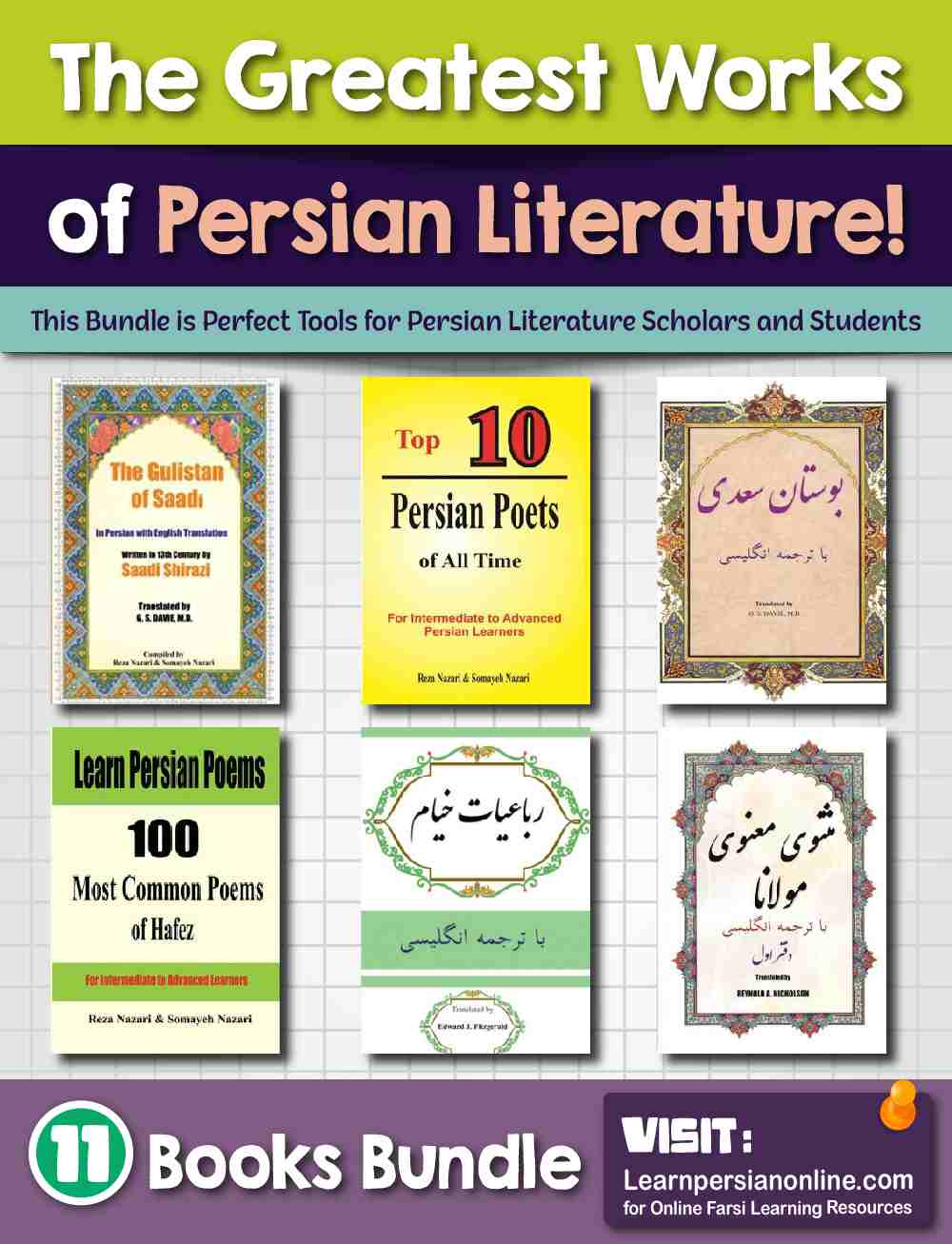
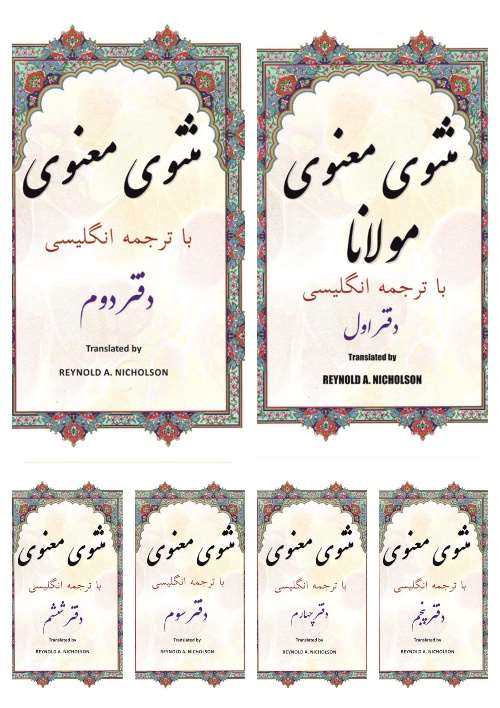
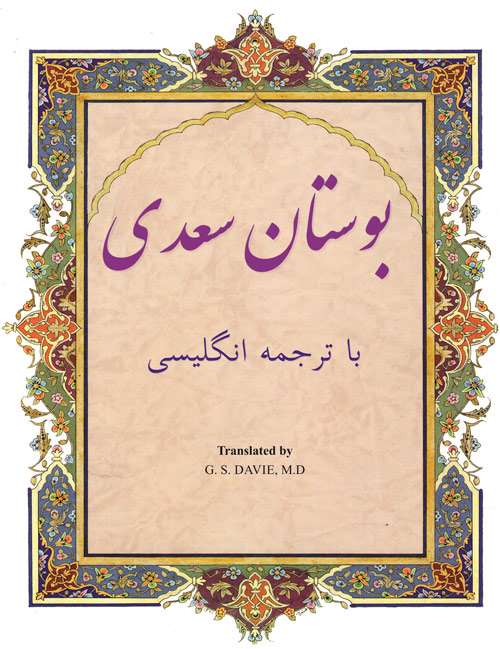
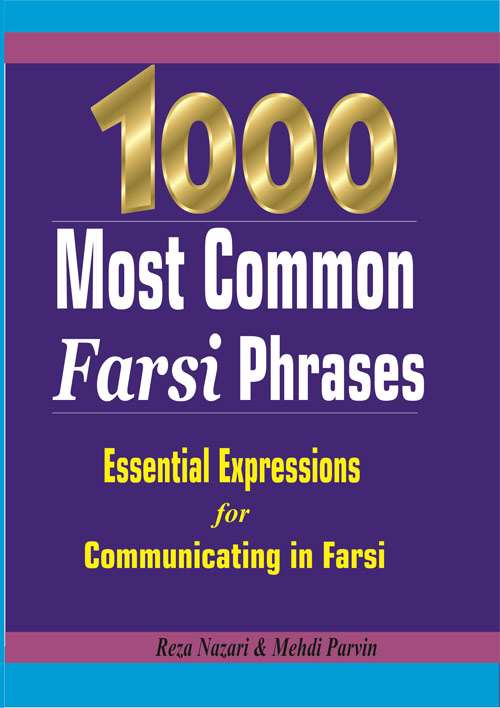
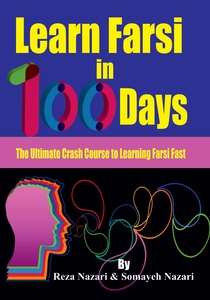






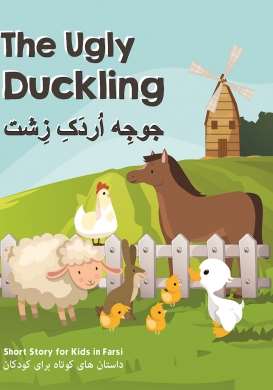
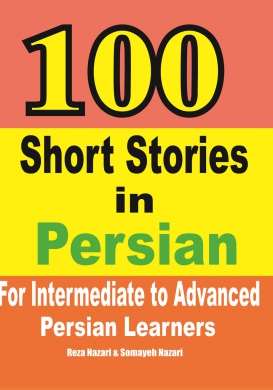
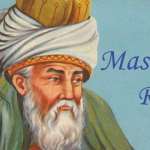
What people say about "Conclusion of the admonishment"?
No one replied yet.